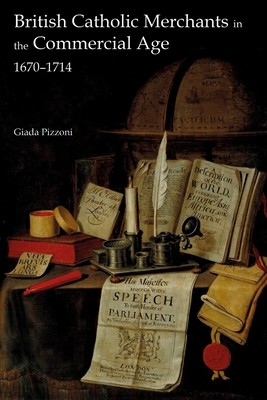
- We will send in 10–14 business days.
- Author: Giada Pizzoni
- Publisher: Boydell Press
- ISBN-10: 1783274387
- ISBN-13: 9781783274383
- Format: 15.6 x 23.4 x 1.4 cm, hardcover
- Language: English
- SAVE -10% with code: EXTRA
Reviews
Description
A rich picture of commercial life among the British Catholic merchants operating in the Atlantic and Mediterranean at the end of the Stuart era.
British Catholic merchants in the long eighteenth century occupied an ambiguous social space. On the one hand, their religion made them marginal and suspect figures in a nation increasingly defining itself by its Protestantism against the Catholic powers of Europe. On the other, their Catholicism, particularly as national rivalries erupted into outright war, afforded them access to markets and contacts overseas which their Protestant competitors found it increasingly difficult to reach.Drawing on extensive original research on the business papers of one prominent Catholic merchant family, the Aylwards, Pizzoni maps a complex network of merchants emanating from trading housesin London, Cadiz and St Malo and linking Britain and Ireland, continental Europe, the Levant and colonial America. She reveals the high level of cooperation between these Catholic houses and their Protestant trading partners - a cooperation which seems to have overridden even such political perils as the Jacobite rebellion - and shows the increasing role played by smuggling and privateering in keeping the wheels of legitimate commerce turning in time of war. A final chapter looks particularly at the business activities of Roman Catholic women, who mostly inherited their husbands' businesses but in many cases developed and expanded them through new activities and investments.
This is a rich picture of commercial life in a time of shifting political and religious attitudes when the pressures of mercantilism led to de facto economic integration for the successful Catholic merchant class and opened up theroad which would lead to emancipation in the next century.
EXTRA 10 % discount with code: EXTRA
The promotion ends in 17d.08:30:24
The discount code is valid when purchasing from 10 €. Discounts do not stack.
- Author: Giada Pizzoni
- Publisher: Boydell Press
- ISBN-10: 1783274387
- ISBN-13: 9781783274383
- Format: 15.6 x 23.4 x 1.4 cm, hardcover
- Language: English English
A rich picture of commercial life among the British Catholic merchants operating in the Atlantic and Mediterranean at the end of the Stuart era.
British Catholic merchants in the long eighteenth century occupied an ambiguous social space. On the one hand, their religion made them marginal and suspect figures in a nation increasingly defining itself by its Protestantism against the Catholic powers of Europe. On the other, their Catholicism, particularly as national rivalries erupted into outright war, afforded them access to markets and contacts overseas which their Protestant competitors found it increasingly difficult to reach.Drawing on extensive original research on the business papers of one prominent Catholic merchant family, the Aylwards, Pizzoni maps a complex network of merchants emanating from trading housesin London, Cadiz and St Malo and linking Britain and Ireland, continental Europe, the Levant and colonial America. She reveals the high level of cooperation between these Catholic houses and their Protestant trading partners - a cooperation which seems to have overridden even such political perils as the Jacobite rebellion - and shows the increasing role played by smuggling and privateering in keeping the wheels of legitimate commerce turning in time of war. A final chapter looks particularly at the business activities of Roman Catholic women, who mostly inherited their husbands' businesses but in many cases developed and expanded them through new activities and investments.
This is a rich picture of commercial life in a time of shifting political and religious attitudes when the pressures of mercantilism led to de facto economic integration for the successful Catholic merchant class and opened up theroad which would lead to emancipation in the next century.


Reviews